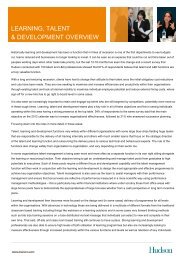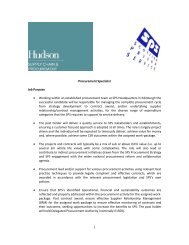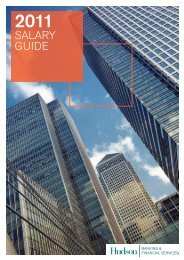Burnout Britain: Raising the Alarm for Employers - Hudson
Burnout Britain: Raising the Alarm for Employers - Hudson
Burnout Britain: Raising the Alarm for Employers - Hudson
Create successful ePaper yourself
Turn your PDF publications into a flip-book with our unique Google optimized e-Paper software.
<strong>Burnout</strong> <strong>Britain</strong>?<br />
<strong>Raising</strong> <strong>the</strong> <strong>Alarm</strong> <strong>for</strong> Employees.<br />
And more personally, employers <strong>the</strong>mselves are also feeling <strong>the</strong> affects directly with more<br />
than a third stating burnout had happened to one or more colleagues.<br />
For an employee, <strong>the</strong> implications of burnout can be far-reaching. Its impact extends to <strong>the</strong>ir<br />
own health, sense of well-being and overall attitude to <strong>the</strong>ir jobs and career. Although <strong>the</strong><br />
research revealed <strong>the</strong> numbers of employees currently experiencing full burnout are low, a<br />
significant proportion of workers are experiencing typical symptoms or displaying worrying<br />
levels of workplace apathy and disinterest, including loss of sleep, emotional exhaustion and<br />
high stress levels.<br />
Yet, despite being unanimous in <strong>the</strong>ir acknowledgement that burnout exists and <strong>the</strong> problem<br />
is worsening, employers still tend to only deal with <strong>the</strong> issue on a largely reactive basis with<br />
many employers simply not having any <strong>for</strong>mal process in place <strong>for</strong> helping an employee who<br />
had suffered from burnout; still less actively encourage <strong>the</strong>ir staff to work fewer hours.<br />
Many workers simply do not believe <strong>the</strong>ir employer had taken measures to address issues<br />
of increased workload and pressure. For that reason, <strong>the</strong> research revealed an apparent<br />
underlying discrepancy between what employers claim to be doing and what <strong>the</strong>y are<br />
actually seen to be doing by employees; one which could prove costly <strong>for</strong> employers and<br />
workers alike.<br />
Key findings<br />
• More than half (52%) of <strong>Britain</strong>’s employees claim to have experienced one or more<br />
symptoms of over-work or burnout in <strong>the</strong> last six months<br />
• One in two employees (49%) and employers (46%) thought <strong>the</strong> situation had<br />
worsened in <strong>the</strong> last five years<br />
• 4% of employees believed <strong>the</strong>y were burned out or near to burnout. A fur<strong>the</strong>r 8% said<br />
<strong>the</strong>y rarely enjoyed <strong>the</strong>ir work and were stressed most of <strong>the</strong> time.<br />
• Employees (76%) and employers (78%) were most likely to believe that <strong>the</strong> increased<br />
pace of business life was a cause of burnout.
















